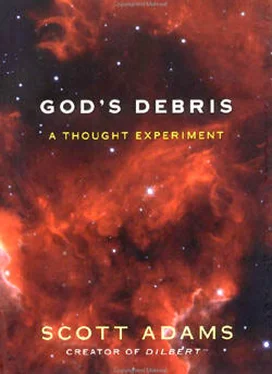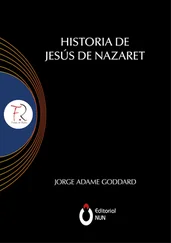“Okay, I think I get that. But how is any of this going to answer my original question about gravity and what makes things move?”
“Have you ever seen a graph of something called a probability distribution?” he asked.
“Yes. It has a bunch of dots on it. The places with the most dots are where there’s the greatest probability,” I said, pleased to remember something from my statistics classes.
“The universe looks a lot like a probability graph. The heaviest concentrations of dots are the galaxies and planets, where the force of gravity seems the strongest. But gravity is not a tugging force. Gravity is the result of probability.”
“You lost me.”
“Reality has a pulse, a rhythm, for lack of better words. God’s dust disappears on one beat and reappears on the next in a new position based on probability. If a bit of God-dust disappears near a large mass, say a planet, then probability will cause it to pop back into existence nearer to the planet on the next beat. Probability is highest when you are near massive objects. Or to put it another way, mass is the physical expression of probability.”
“I think I understand that, sort of,” I lied.
“If you observed God-dust that was near the Earth it would look like it was being sucked toward the planet. But there is no movement across space in the sense that we understand it. The dust is continuously disappearing in one place and appearing in another, with each new location being nearer the Earth.”
“I prefer the current theory of gravity,” I said. “Newton and Einstein had it pretty much figured out. The math works with their theories. I’m not so sure about yours.”
“The normal formulas for gravity work fine with my description of reality,” he replied. “All I’ve done is add another level of understanding. Newton and Einstein gave us formulas for gravity, but neither man answered the question of why objects seem attracted to each other.”
“Einstein did explain it,” I said. “Remember, we talked about that? He said space was warped by matter, so what looks like gravity is just objects following the path of warped space.”
The old man just looked at me.
“Okay,” I said. “I admit I don’t know what any of that means. It does sound like nonsense.”
“Einstein’s language about bent space and my description of God-dust are nothing more than mental models. If they help us deal wth our environment, they are useful. My description of gravity is easier to understand than Einstein’s model. In that sense, mine is better.”
I chuckled. I had never heard anyone compare himself to Einstein. I was impressed by his cockiness but not convinced. “You haven’t explained orbits. Under your theory, how could a moon orbit a planet and not be sucked into it? Your God-dust would pop into existence closer to the planet every time it appeared until it crashed into the surface.”
“You are ready for the second law of gravity.”
“I guess I am.”
“There is one other factor that influences the position of matter when it pops back into existence. That force is inertia, for lack of a better word. Although God-dust is unimaginably small, it has some probability of popping into existence exactly where another piece of God-dust exists. When that happens, one of the particles has to find a new location and alter its probability. To the observer, if one could see such tiny happenings, it looks like the particles collide and then change direction and speed. The new speed is determined by how far from its original spot the God-dust appears with each beat of the universe. If each new location is far from the old spot, we perceive the object to be moving fast.”
He continued. “So there is always a dual probability influencing each particle of God-dust. One probability makes all God-dust pop into existence nearer to other God– dust. The other probability is that the dust will appear along a straight line drawn from its past. All apparent motion in the universe is based on those competing probabilities.
“Earth’s moon, for example, has a certain probability of coming toward the Earth and a certain probability of moving in a straight line. The two probabilities are, by chance, in balance. If gravity were a tugging force, the way we normally think of it, there would be some sort of friction, slowing the moon and eventually dragging it to Earth. But since gravity is nothing more than probability, there is no friction or tugging. The moon can orbit almost indefinitely because its position is determined by probability, not by tugging or pushing.”
“What if all the dust that makes up the moon doesn’t reappear near its last position?” I asked. “You said it’s only a matter of probability where the dust reappears, so couldn’t the moon suddenly vanish if all its dust disappeared and then appeared on the other side of the solar system?”
“Yes, it could. But the probability of that is ridiculously small.”
“The trouble with your theory,” I said, “is that matter doesn’t pop in and out of existence. Scientists would have noticed that by now.”
“Actually, they have. Matter pops into and out of existence all the time. That’s what a quantum leap is. You’ve probably heard the term but didn’t know its origin.”
“I’ll be darned,” I said.
“Explain free will,” I said.
“Imagine a copper penny that is exactly like an ordinary penny except that for this discussion it has consciousness. It knows it is a coin and it knows that you sometimes flip it. And it knows that no external force dictates whether it comes up heads or tails on any individual flip.
“If the penny’s consciousness were like human consciousness, it would analyze the situation and conclude that it had free will. When it wanted to come up heads, and heads was the result, the penny would confirm its belief in its power to choose. When it came up tails instead, it would blame its own lack of commitment, or assume God had a hand in it.
“The imaginary coin would believe that things don’t just ‘happen’ without causes. If nothing external controlled the results of the flips, a reasonable penny would assume that the control came from its own will, influenced perhaps by God’s will, assuming it were a religious penny.
“The penny’s belief in its own role would be wrong, but the penny’s belief in God’s role would be right. Probability—the essence of God’s power—dictates that the penny must sometimes come up tails even when the penny chooses to be heads.”
“But people aren’t pennies,” I said. “We have brains. And when our brains make choices, we move our arms and legs and mouths to make things happen. The penny has no way to turn its choices into reality, but we do.”
“We believe we do,” the old man said. “But we also believe in the scientific principle that any specific cause, no matter how complex, must have a specific effect. Therefore, we believe two realities that cannot both be true. If one is true, the other must be false.”
“I’m not following you,” I said.
“The brain is fundamentally a machine. It’s an organic machine with chemical and electrical properties. When an electrical signal is formed, it can only make one specific thing happen. It can’t choose to sometimes make you think of a cow and sometimes make you fall in love. That one specific electrical impulse, in the one specific place in your brain, can have one and only one result on your actions.”
“We’ve been through this. Maybe the brain is exempt from the normal rules because of free will or the soul. I know I can’t define those things, but you can’t rule them out.”
“Nothing in life can be ruled out. But the penny analogy is a simple explanation of free will that makes sense and has no undefined concepts.”
Читать дальше












